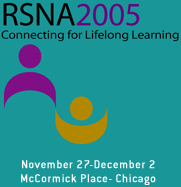
Abstract Archives of the RSNA, 2005
SSK03-07
Locoregional Treatment of Large Adrenal Metastasis: Transcatheter Arterial Embolization/Chemoembolization (TAE/TACE) Therapy Alone or Combined with Radiofrequency Ablation (RFA)
Scientific Papers
Presented on November 30, 2005
Presented as part of SSK03: Vascular/Interventional (Oncologic Intervention)
Francesco Fiore MD, Presenter: Nothing to Disclose
R D Angelo MD, Abstract Co-Author: Nothing to Disclose
M Cascella MD, Abstract Co-Author: Nothing to Disclose
Orlando Catalano MD, Abstract Co-Author: Nothing to Disclose
R V Iaffaioli MD, Abstract Co-Author: Nothing to Disclose
Alfredo Siani MD, Abstract Co-Author: Nothing to Disclose
Adrenal metastases, either isolated or combined with a (well controlled) intrahepatic recurrence, are preferably treated with surgery. This aggressive management seems to offer long-term survival to selected patients. When resection is technically not feasible, some Authors have proposed RFA. Nevertheless, RFA has unsatisfactory response in patients with large lesions. We report our experience using TAE/TACE for adrenal metastases >5 cm. Cases with large residual tumor after TAE/TACE subsequently underwent RFA.
From January 2002 to April 2005 we have treated twelve patients with adrenal metastasis in good performance status. These subjects were non responding to systemic chemotherapy or progressing after chemotheraphy and were not eligible for surgery. There were 14 adrenal metastases: 8 from HCC (1 bilateral involvement), 1 from lung cancer, 1 from prostate gland sarcoma, and 1 from colon cancer (bilateral adrenal involvement). Arteriographic study of celiac trunk, superior mesenteric artery, and renal artery was performed to map the adrenal arteries. Superselective catheterization was done with 3 Fr. hydrophilic flexible microcatheter after selective catheterization of the main adrenal arterial branches. We then embolized the most evident vessels tributary to the adrenal mass with PVA powder of 45-150 mm diameter. TACE (50 mg of epirubicin plus 5 mL of Lipiodol) was carried out in 4 patient while 8 only had TAE therapy. In case pain persistence or of incomplete tumor devascularization, RFA was performed.
Results
We performed helical CT evaluation one month later, to assess response rate. After TAE/TACE, we observed a partial response of the target lesion in 3 patients and a stable disease, with a reduction of CT attenuation values in 9 patients. RFA was performed in 4 patients.
Our study proves that locoregional treatment techniques of adrenal metastasis are safe and technically feasible procedures, allowing an effective devascularization of adrenal metastases and a positive short-to-medium term clinical effects. Largest randomized series and long-term follow-up studies are needed to test if our protocol affects patient survival.
Fiore, F,
D Angelo, R,
Cascella, M,
Catalano, O,
Iaffaioli, R,
Siani, A,
Locoregional Treatment of Large Adrenal Metastasis: Transcatheter Arterial Embolization/Chemoembolization (TAE/TACE) Therapy Alone or Combined with Radiofrequency Ablation (RFA). Radiological Society of North America 2005 Scientific Assembly and Annual Meeting, November 27 - December 2, 2005 ,Chicago IL.
http://archive.rsna.org/2005/4419712.html

